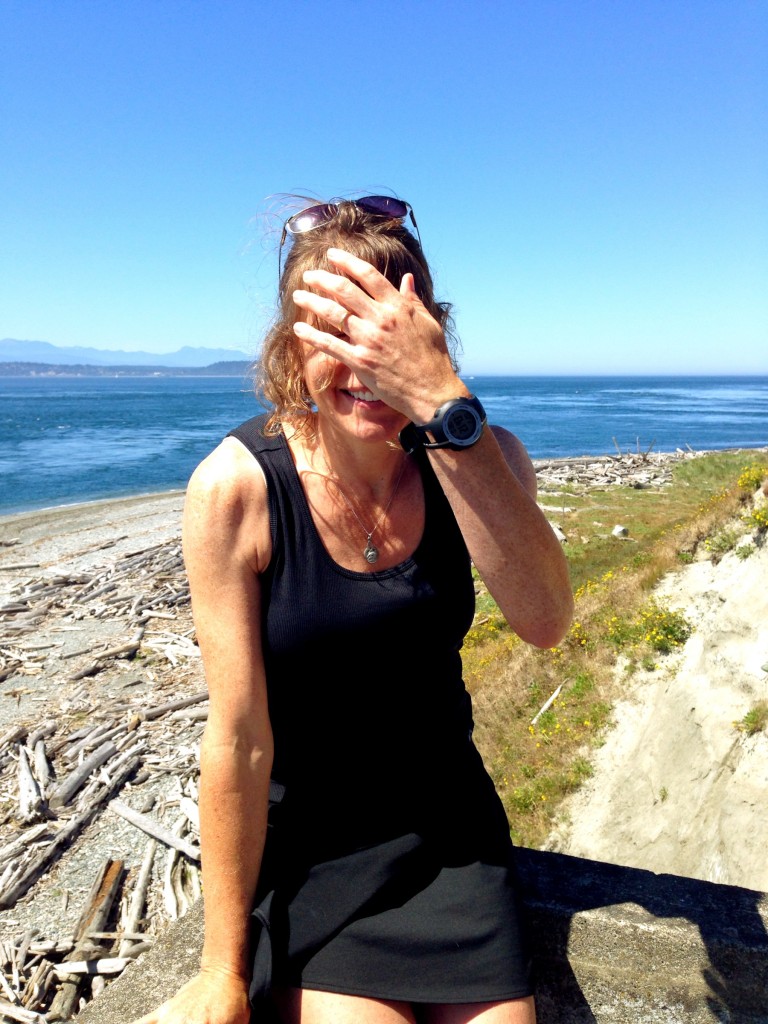Last week, a writer friend 'fessed to our online group that this birthday, her 45th, had her feeling blue. She lamented landing smack in middle age in a culture that turns up its nose at gray hair, wrinkles, and sagging flesh. She felt old and unwanted, washed up.
Hey now. Hang on just a cotton-pickin' minute. I'M turning 45 in less than a month. It hadn't occurred to me to feel washed up and unwanted. I poised my fingers over the keyboard, ready to tap out a cheery response about how liberating the 40s are, how it's up to us to reclaim our bodies and redefine what's beautiful and sexy and blah blah blah. But I held off. She wasn't in the mood for chipper. She needed a hug, some chocolate cake, a hot bath and a good cry. Forty-five is sort of the tipping point, isn't it? Most of the big, fun, memorable stuff has happened. Your youth and beauty began to dim around the first season of Mad Men. Now the Big Slide begins. Forty-five is (at least) halfway to dead.
I dunno. I might have to get all chipper on your ass with a WOO HOO! I'm 45 and fabulous! Not that this decade started out bright and shiny. In the months leading up to my 40th birthday, it seemed my body was staging a coup against me. Surgery for a softball-sized tumor on an ovary (benign, TG), followed weeks later by my first pregnancy, followed months later by our first child loss. Additional surgeries in subsequent years, anemia, another pregnancy, another loss, depression, anxiety, and the most vexing to my vanity—the dual indignities of gray hair and acne—along with the most troubling to my heart—the pooch of a belly that has held children my arms never will.
But I kept my head down and kept going. Kept running up hills and folding into Downward Dog. I ate kale, I wore sunscreen. I'm cresting the hill and seeing 50 on the horizon. And I feel fine. Twenty-five years ago, you couldn't have paid me to run half a mile. This morning, nine easy. Yes, okay, the right knee got a little gimpy on the downhills, not sure what's up with that, but I felt joy. Pure, ageless, joy. It occurred to me as I read my friend's words that I must have landed, at some point in these past five years—after a lifetime rueing my lumpy features and freckles, wishing I could find some way to part with my mother's wide hips and her broad backside and add the height denied me by the family gene pool—on the make peace side of the physical me.
I live in the county with the state's oldest median population and our city average is even older: approaching 60. I swim at the YMCA a couple of times a week and my lap lane partners smoke me. Men and women in their 60s, 70s, 80s, eating my lunch with their smooth strokes. The women's aging bodies, on full display in the locker room with all their lumps and stretched out tattoos, their surgical scars, their scalps showing pink through their cotton-white hair, fill me with awe. They are so beautiful. They are so alive. They giggle and sing, they talk about their house renovations, grandkids, and trips to Vienna. When I grow up, I want to be just like them.
There's a hollow place in me where all the terror of getting old and dying goes. The fear that cancer-m.s.-alzheimer's-stroke-insert-irrational-health-scare-here lurks just a step into my future, or that I will end up homeless and alone, or that existentially, my life has little value—those Wide Awake at 3 a.m. Worries—(although, since I started ingesting a teaspoon of hops/valerian tincture before bed, my peri-menopausal night sweats are gone and I sleep soundly most nights, insomnia is rare. Seriously, women, this stuff is amazing) plague me.
But in the bright light of day, I feel beautiful and strong. Perversely, there's a bit of pushback from the sisterhood—a sense that it's one thing for a middle-aged woman to make peace with her flaws, but another entirely for her to be proud of her skin and the flesh underneath, or that somehow it's an easier road for some (a woman informed me last year that my shape came from the fact I hadn't given birth). It's a reminder that this nebulous "society" we vitiate for not accepting us the way we are is, in fact, the very us we see in the mirror. 
Another friend celebrated a birthday this week, too—she's just north of 50—and she articulated more of what's in my heart as I approach this half-life age: a melancholy, not about a changing, aging body, but about those missed or messed up opportunities, the might-have-beens, the what-ifs, the if-onlys.
It is the making peace with the regrets that, along with eliminating processed foods, eschewing sugar, and pounding out the trail runs, I am counting on to ease me into the next half of this life with grace and dignity. It's a daily struggle.
Letting go is the hardest workout of all.
“If you must look back, do so forgivingly. If you must look forward, do so prayerfully. However, the wisest thing you can do is be present in the present…gratefully.” -Maya Angelou
“The most solid advice for a writer is this, I think: Try to learn to breathe deeply, really to taste food when you eat, and when you sleep really to sleep. Try as much as possible to be wholly alive with all your might, and when you laugh, laugh like hell. And when you get angry, get good and angry. Try to be alive. You will be dead soon enough.” William Saroyan
